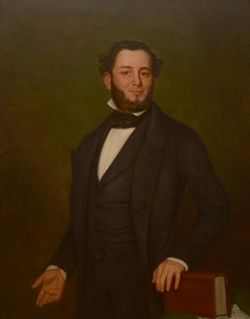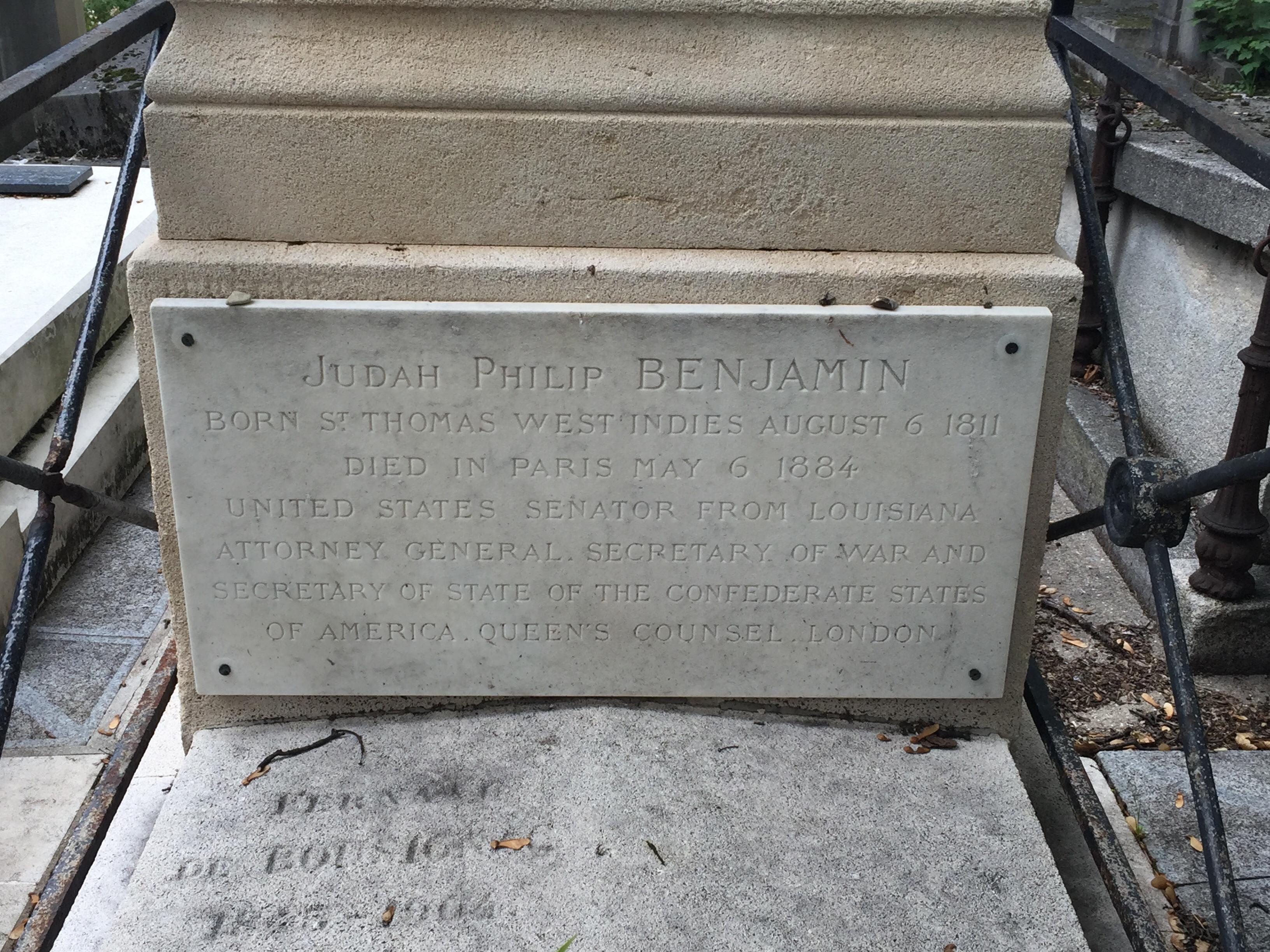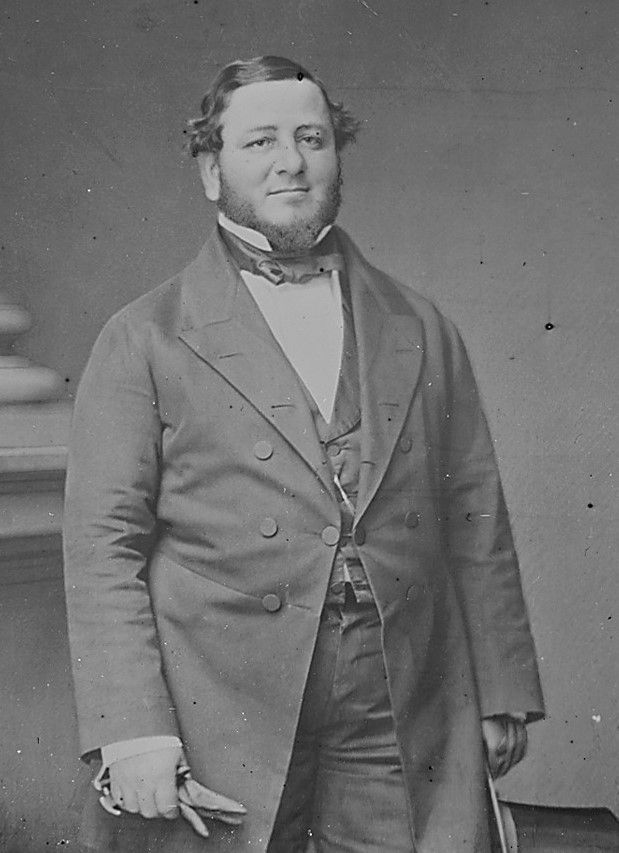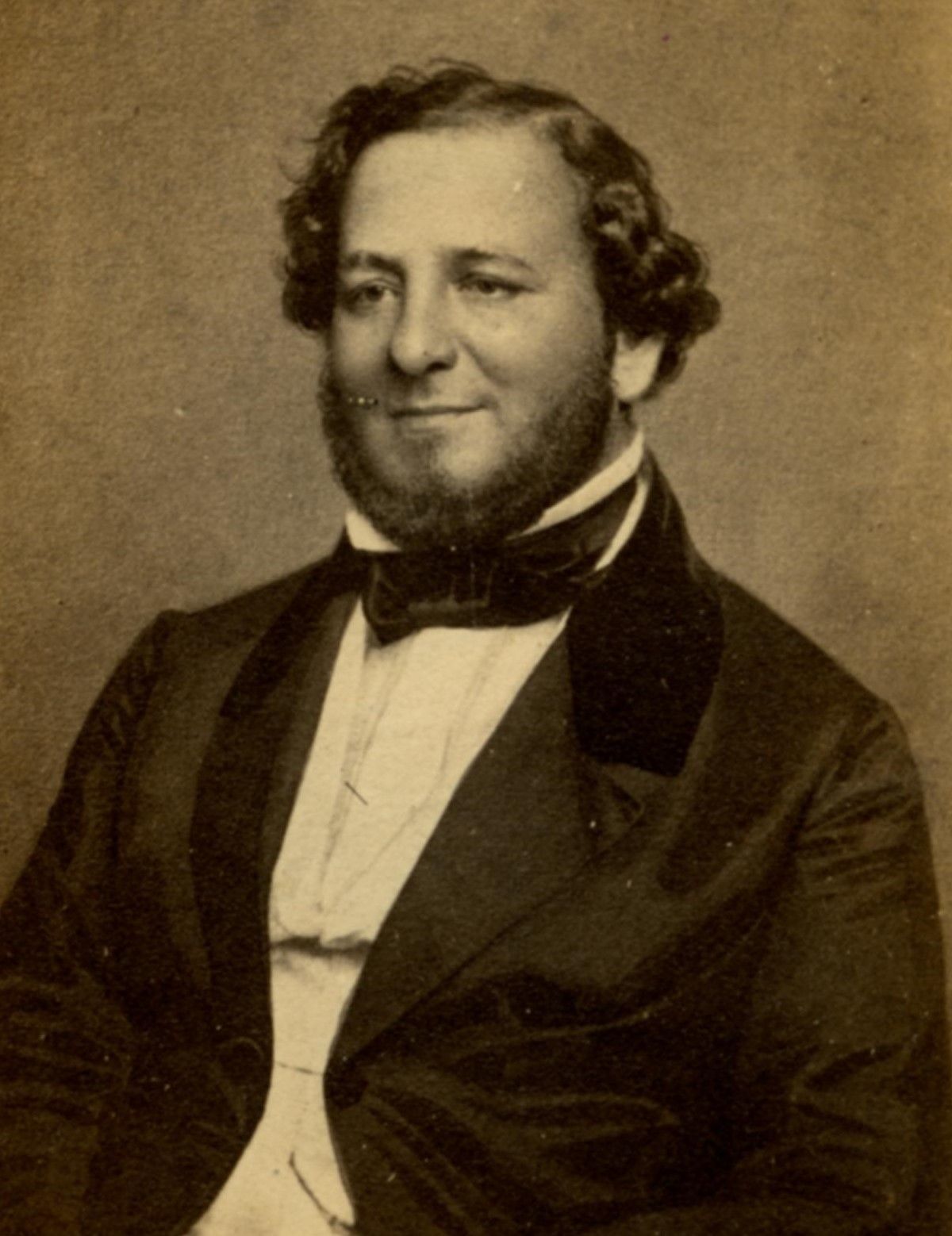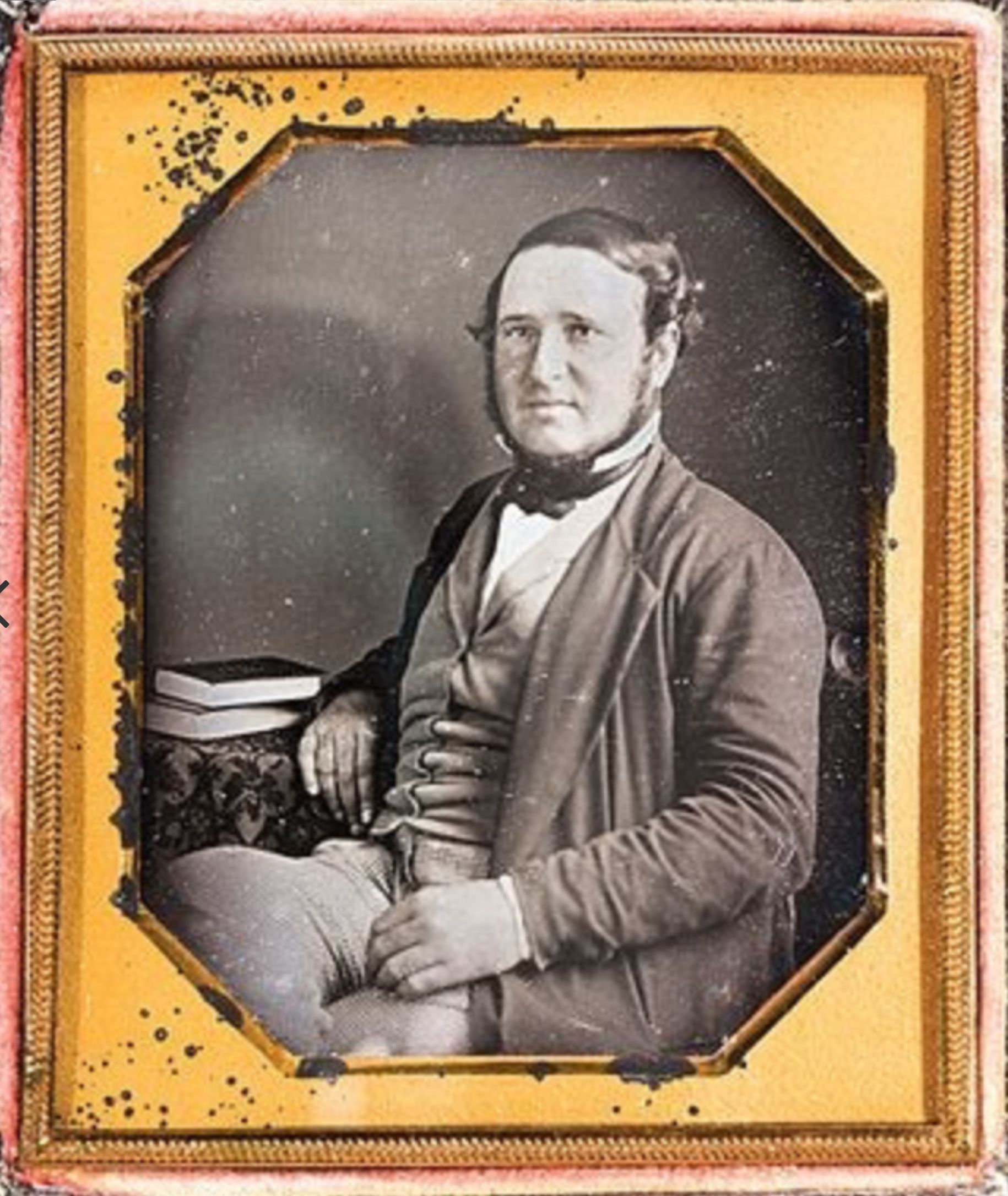United States Senator, Cabinet Member of the Confederate States of America. He was a 19th-century politician who was called "The Brains of the Confederacy" and the "jolly rotundity." During his political career, he pledged allegiance to three separate national flags. Born a British subject as the son of Sephardic Jewish immigrant parents Philip and Rebecca de Mendes Benjamin, who came to the West Indies as Dutch and Portuguese extractions, he was brought to North Carolina at around age two. Although, throughout his life, he identified himself as a Jew, he did not always practice the rituals. He received a private Presbyterian academy education until his father became bankrupt and relocated to South Carolina, where he finished his education financed by the Hebrew Orphan Society. At a young age, he became political in the South, supporting the owning of slaves. In 1825, he was sent to Yale University to study by an unknown benefactor. While at Yale, he earned honors for both academics and debate. At the start of his junior year in 1825, he abruptly left Yale, but thirty years later, letters were produced by his political enemies as evidence that his dismissal from Yale was based on a theft allegation, although thought to have antisemitic origins. From this lesson, he learned about leaving and documenting evidence. After brief stops in Upstate New York and Charleston, he went to New Orleans by 1828 and began to study law in his spare time. He also supplemented his income by teaching English to French-speaking Creoles, an activity that brought him into contact with the wealthy St. Martin family. Besides English, he spoke French and Spanish. Admitted to the Bar in December of 1832, he married one of his students, the captivating 16-year-old Natalie Bauché St. Martin, in a Catholic ceremony in February of 1833. An agreement at the time of the marriage was made that any children would be Roman Catholic. After making a home in an elegant townhouse on Bourbon Street in New Orleans, the marriage became very unstable with his wife's extravagant spending and numerous public romantic affairs. After an eleven-year marriage, his wife relocated to Paris with their five-year-old daughter Ninette, to only return for a short time while he was a United States senator, yet quickly returned to Paris after her notorious lifestyle was made public. Defending cargo insurance companies, he gained national attention when a cargo of rebellious slaves onboard a slave trader's ship, the "Creole," commandeered ship and sailed to a British territory, thus freeing the slaves. The lost cargo was not lost at sea but freed. He argued that the owners of the slaves were responsible for the slave's actions and not the insurance companies. This high-profile law practice, which he won, brought him into politics, entering the state legislature in 1842. He advocated for free public education for girls and outlawing the separation of slave families. In the mid-1840s, he also bought Belle Chase Plantation in Plaquemines Parish, where he built a large mansion and pioneered more efficient means of sugar processing before selling the property and ceasing to own any enslaved in 1852. In 1853, as a Whig, he became the first practicing Jew in the US Senate while maintaining his law practice. While in Washington, D.C., his many talents were recognized. Following being offered an appointment to the US Supreme Court by both United States Presidents Millard Fillmore and Franklin Pierce, he declined because the obligations of a spendthrift wife in Paris and a large extended family would not permit him to accept an 80% income reduction. While in the Senate, he befriended Jefferson Davis, the senator from the neighboring state of Mississippi. Benjamin was an eloquent defender of states' rights and "owning" the enslaved, but wanted to preserve the Union. After the demise of the Whig party, he was re-elected as a Democrat at the dawn of the American Civil War. On January 26, 1861, Louisiana seceded from the Union, which led to him resigning from the United States Senate on February 4, 1861, with the war being declared on April 12, 1861. Confederate States of America President Jefferson Davis wanted him to serve in his cabinet, being appointed first Attorney General from February 25, 1861, until being appointed Secretary of War from September 17, 1861 to March 24, 1862, and last Secretary of State from March 18, 1862 until the end of the war. Sequentially, he served six days as both Secretary of War and Secretary of State and was Davis' constant advisor, always using much-needed tact with him and other cabinet members. Taking the blame that was not his to take, he dealt with the other members' incompetency and alcoholism and the government's lack of funding to wage war. Serving under the flag of the Stars and Bars, he was the first Jewish Cabinet member in North America. As the war ended, he, along with others, fled Richmond to Georgia, burning all his papers to eliminate evidence, as he felt that as a Jew, he would receive an unfair trial and would be given a harsher sentence than even Davis. Leaving Georgia through Florida on May 3, 1865, he escaped as a French-speaking common laborer, sailing to England and arriving on August 30, 1865, after experiencing a storm and fire at sea. He claimed British citizenship by birth and began serving under a third flag, the Union Jack, at age 54. Although some believe he had a vast amount of "Confederate Gold," his lifestyle did not witness this exaggeration. He began a career in journalism, writing for newspapers and magazines. After joining Lincoln's Inn as a law student, he was recognized as a law scholar, being called to the bar in 1866 and soon becoming a barrister. When general amnesty made it possible for him to return to the United States, he had no desire to leave his comfortable life in England, and the same year, he published a law text, "Benjamin on Sales." In 1872, he was made Queen's Counsel, making him the first Jew and the first not born in England to receive this honor. With aging, his health declined greatly with the diagnosis of being a diabetic before insulin and with the complications of heart disease and obesity. In 1881, he was in a trolley car accident where he received a head injury from which he never fully recuperated. He retired to his wife's home in Paris. Once again, he burned all his professional papers. He died two years later and was buried in his son-in-law's family plot under the name of "Philippe Benjamin." He did not receive a proper marker until 1938, when one was placed by the Paris Chapter of the United Daughters of the Confederacy. When the American Civil War ended, he did not speak of it again, and at his own request, Jefferson Davis did not mention him in his two-volume memoir. Because he burned his papers, historians and biographers alike have had difficulty documenting his career, yet volumes have been written about his life.
United States Senator, Cabinet Member of the Confederate States of America. He was a 19th-century politician who was called "The Brains of the Confederacy" and the "jolly rotundity." During his political career, he pledged allegiance to three separate national flags. Born a British subject as the son of Sephardic Jewish immigrant parents Philip and Rebecca de Mendes Benjamin, who came to the West Indies as Dutch and Portuguese extractions, he was brought to North Carolina at around age two. Although, throughout his life, he identified himself as a Jew, he did not always practice the rituals. He received a private Presbyterian academy education until his father became bankrupt and relocated to South Carolina, where he finished his education financed by the Hebrew Orphan Society. At a young age, he became political in the South, supporting the owning of slaves. In 1825, he was sent to Yale University to study by an unknown benefactor. While at Yale, he earned honors for both academics and debate. At the start of his junior year in 1825, he abruptly left Yale, but thirty years later, letters were produced by his political enemies as evidence that his dismissal from Yale was based on a theft allegation, although thought to have antisemitic origins. From this lesson, he learned about leaving and documenting evidence. After brief stops in Upstate New York and Charleston, he went to New Orleans by 1828 and began to study law in his spare time. He also supplemented his income by teaching English to French-speaking Creoles, an activity that brought him into contact with the wealthy St. Martin family. Besides English, he spoke French and Spanish. Admitted to the Bar in December of 1832, he married one of his students, the captivating 16-year-old Natalie Bauché St. Martin, in a Catholic ceremony in February of 1833. An agreement at the time of the marriage was made that any children would be Roman Catholic. After making a home in an elegant townhouse on Bourbon Street in New Orleans, the marriage became very unstable with his wife's extravagant spending and numerous public romantic affairs. After an eleven-year marriage, his wife relocated to Paris with their five-year-old daughter Ninette, to only return for a short time while he was a United States senator, yet quickly returned to Paris after her notorious lifestyle was made public. Defending cargo insurance companies, he gained national attention when a cargo of rebellious slaves onboard a slave trader's ship, the "Creole," commandeered ship and sailed to a British territory, thus freeing the slaves. The lost cargo was not lost at sea but freed. He argued that the owners of the slaves were responsible for the slave's actions and not the insurance companies. This high-profile law practice, which he won, brought him into politics, entering the state legislature in 1842. He advocated for free public education for girls and outlawing the separation of slave families. In the mid-1840s, he also bought Belle Chase Plantation in Plaquemines Parish, where he built a large mansion and pioneered more efficient means of sugar processing before selling the property and ceasing to own any enslaved in 1852. In 1853, as a Whig, he became the first practicing Jew in the US Senate while maintaining his law practice. While in Washington, D.C., his many talents were recognized. Following being offered an appointment to the US Supreme Court by both United States Presidents Millard Fillmore and Franklin Pierce, he declined because the obligations of a spendthrift wife in Paris and a large extended family would not permit him to accept an 80% income reduction. While in the Senate, he befriended Jefferson Davis, the senator from the neighboring state of Mississippi. Benjamin was an eloquent defender of states' rights and "owning" the enslaved, but wanted to preserve the Union. After the demise of the Whig party, he was re-elected as a Democrat at the dawn of the American Civil War. On January 26, 1861, Louisiana seceded from the Union, which led to him resigning from the United States Senate on February 4, 1861, with the war being declared on April 12, 1861. Confederate States of America President Jefferson Davis wanted him to serve in his cabinet, being appointed first Attorney General from February 25, 1861, until being appointed Secretary of War from September 17, 1861 to March 24, 1862, and last Secretary of State from March 18, 1862 until the end of the war. Sequentially, he served six days as both Secretary of War and Secretary of State and was Davis' constant advisor, always using much-needed tact with him and other cabinet members. Taking the blame that was not his to take, he dealt with the other members' incompetency and alcoholism and the government's lack of funding to wage war. Serving under the flag of the Stars and Bars, he was the first Jewish Cabinet member in North America. As the war ended, he, along with others, fled Richmond to Georgia, burning all his papers to eliminate evidence, as he felt that as a Jew, he would receive an unfair trial and would be given a harsher sentence than even Davis. Leaving Georgia through Florida on May 3, 1865, he escaped as a French-speaking common laborer, sailing to England and arriving on August 30, 1865, after experiencing a storm and fire at sea. He claimed British citizenship by birth and began serving under a third flag, the Union Jack, at age 54. Although some believe he had a vast amount of "Confederate Gold," his lifestyle did not witness this exaggeration. He began a career in journalism, writing for newspapers and magazines. After joining Lincoln's Inn as a law student, he was recognized as a law scholar, being called to the bar in 1866 and soon becoming a barrister. When general amnesty made it possible for him to return to the United States, he had no desire to leave his comfortable life in England, and the same year, he published a law text, "Benjamin on Sales." In 1872, he was made Queen's Counsel, making him the first Jew and the first not born in England to receive this honor. With aging, his health declined greatly with the diagnosis of being a diabetic before insulin and with the complications of heart disease and obesity. In 1881, he was in a trolley car accident where he received a head injury from which he never fully recuperated. He retired to his wife's home in Paris. Once again, he burned all his professional papers. He died two years later and was buried in his son-in-law's family plot under the name of "Philippe Benjamin." He did not receive a proper marker until 1938, when one was placed by the Paris Chapter of the United Daughters of the Confederacy. When the American Civil War ended, he did not speak of it again, and at his own request, Jefferson Davis did not mention him in his two-volume memoir. Because he burned his papers, historians and biographers alike have had difficulty documenting his career, yet volumes have been written about his life.
Bio by: Linda Davis
Inscription
Judah Philip BENJAMIN
born St Thomas West Indies August 6 1811
died in Paris May 6 1884
United States Senator from Louisiana
Attorney General, Secretary of War and
Secretary of State of the Confederation States
of America, Queen's Counsel, London.
Gravesite Details
In 1938 the Paris Chapter of the United Daughters of the Confederacy placed a proper marker on his grave.
Family Members
Advertisement
See more Benjamin memorials in:
Advertisement
